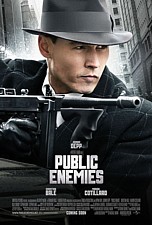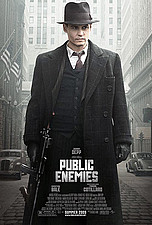
Knight at the Movies Archives
Michael Mann's old fashioned gangster epic all comes down to the mega watt appeal of star Johnny Depp
The role of the infamous bank robber John Dillinger fits Johnny Depp as elegantly as one of the many finely tailored suits that he
sports throughout Public Enemies, Michael Mann’s epic sized gangster picture. That’s because the film, scripted by Ronan
Bennett, Mann and Ann Biderman has obviously been tailored to trade on Depp’s screen persona: the confident man of few words
with the dashing good looks, the always present innate coolness and above all, the masculine sensitivity that is irresistible to the
ladies (and the gay men). The result is an anti-hero glamorized in much the way that Clark Gable’s bad boy character was
romanticized in Manhattan Melodrama, the 1934 gangster picture that Dillinger watched just before being shot down by FBI agents
outside Chicago’s legendary Biograph theatre.
Dillinger’s romance with Billie Frechette (played by La vie en Rose Oscar winner Marion Cotillard) has also been heightened to the
point where it becomes the central motivating force for Depp’s character and for the movie. Mann’s film, in bringing the doomed
romance of the bank robbing but innately decent Robin Hood figure to the forefront of the story, opts for the time tested old
fashioned approach of dozens of classic movies from the Hollywood canon. Fresh it isn’t but audiences hungry for an emotionally
gratifying, familiar going movie experience after a spate of spiritless boom crash, characterless special effects blockbusters will be
particularly satisfied by Public Enemies. Mann has eschewed his signature battery of editing tics and curbed his propensity for in your
face graphic violence (the stylized violence here is more in keeping with any number of cops and robbers movies). He brings his
considerable gifts to bear on what is essentially a traditional crime drama with a romantic flair – a mixture of The Untouchables and
Bugsy. The film offers audiences a great time, letting them luxuriate in a plethora of melodramatic flourishes, the whole awash in
vintage Billie Holiday tunes and intricate period detail – and it could just as easily been titled Chicago Melodrama.
The movie, shot in high definition and mostly at night, is often suffused with a golden hue that adds to the overall lush, gloomy
romantic tone that is very fetching. Many of these golden hued scenes are interiors that take place in cavernous, Art Deco spaces
that dwarf the nameless extras as Mann focuses on his main characters. Depp’s Dillinger is portrayed as a gentleman bandit – an
honorable thief with standards, a loner’s sure sense of confidence and an effortless womanizer. We see him during a bank robbery
tell a poor farmer to put his money away, give up his expensively tailored coat to a shivering female bank hostage (later, the
uniqueness of the coat leads to his capture and temporary incarceration), and when he at last meets Billie, working as a coat check
girl, nothing will keep him from his girl who in seconds of screen time morphs from a pretty girl to The One.
The two dance to a sumptuous version of “Bye Bye Blackbird” by Diana Krall (glimpsed on the bandstand) which immediately
becomes “their song.” The romance is on and throughout the rest of the picture it’s back and forth between Cotillard crying for her
“Chonny” in her thick French accent and Depp pulling off one daring feat after another. Prissy, tight mouthed FBI director J. Edgar
Hoover (Billy Crudup in a nice, cryptic performance), forever followed by his smirking number two Clyde Tolson (Chandler Williams)
and a phalanx of good looking G-men knows he needs to bring down Public Enemy number one in order to solidify his power and
that of his newly formed organization. After a series of set backs, Melvin Purvis (Christian Bale, still intense but more subdued than
one of his blockbuster characters) seems about to do that when he comes briefly face to face with his arch enemy during Dillinger’s
brief incarceration – only to see himself and the Feds embarrassed time and time again until the infamous Lady in Red comes
forward to tip him off to Dillinger’s whereabouts.
The over familiarity of the story (the material has been the basis for at least five movies) is offset by Mann’s elegant technique –
Dillinger’s arrival in a rainstorm by night at Indiana for transport to a prison is thrillingly shot and edited as is the shootout at the
wooded, north Wisconsin Little Bohemia lodge (yet another beautiful night sequence). Ostensibly, Dillinger’s downfall is caused by
the syndicate turning their back on him when his notoriety interferes with their profits but we are guided to believe that his over
confidence and his inability to let go of his Big Love are the things that really sealed his fate.
The movie would have us believe that on the afternoon of his death Dillinger walked unnoticed into the office of the task force
designed to bring him down, gazing at photographs of himself and his mostly now dead compatriots, even engaging distracted
policemen in conversation before strolling out again. Later, Mann even gives Dillinger dying words that a compassionate G-Man
secretly imparts to a tearful Billie. Naturally, this being a supreme example of revisionist history, they have to do with Their Song. It
hardly matters that there’s not been much heat between Depp and Cotillard in evidence or that there’s not much fealty at this point
to the facts.
Like Robert Mitchum, James Dean, Greta Garbo and a few others in their heyday Depp makes for a smashing anti-hero who
audiences won’t just mind seeing die onscreen, but will actually revel in. Depp is a singular, mesmerizing screen presence who has
yet to have a single on screen love interest that can compete with the audiences’ moony affection for him. Mann knows this and
though he stuffs this vastly entertaining epic with a raft of familiar character actors (everyone from Lili Taylor to Stephen Dorff), it all
comes down to those smoldering eyes. When Depp wailed, “I’m burning for you baby” at one point in Cry Baby he was speaking for
his worshipful audience. Lurching around in the Pirate movies, supremely evil in Sweeney Todd, weirdly child-like in Charlie and the
Chocolate Factory, geeky and phobic in Sleepy Hollow, Public Enemies once again gives us the dreamy Depp of Finding Neverland and
Chocolat.
I’m burning for you, baby.
sports throughout Public Enemies, Michael Mann’s epic sized gangster picture. That’s because the film, scripted by Ronan
Bennett, Mann and Ann Biderman has obviously been tailored to trade on Depp’s screen persona: the confident man of few words
with the dashing good looks, the always present innate coolness and above all, the masculine sensitivity that is irresistible to the
ladies (and the gay men). The result is an anti-hero glamorized in much the way that Clark Gable’s bad boy character was
romanticized in Manhattan Melodrama, the 1934 gangster picture that Dillinger watched just before being shot down by FBI agents
outside Chicago’s legendary Biograph theatre.
Dillinger’s romance with Billie Frechette (played by La vie en Rose Oscar winner Marion Cotillard) has also been heightened to the
point where it becomes the central motivating force for Depp’s character and for the movie. Mann’s film, in bringing the doomed
romance of the bank robbing but innately decent Robin Hood figure to the forefront of the story, opts for the time tested old
fashioned approach of dozens of classic movies from the Hollywood canon. Fresh it isn’t but audiences hungry for an emotionally
gratifying, familiar going movie experience after a spate of spiritless boom crash, characterless special effects blockbusters will be
particularly satisfied by Public Enemies. Mann has eschewed his signature battery of editing tics and curbed his propensity for in your
face graphic violence (the stylized violence here is more in keeping with any number of cops and robbers movies). He brings his
considerable gifts to bear on what is essentially a traditional crime drama with a romantic flair – a mixture of The Untouchables and
Bugsy. The film offers audiences a great time, letting them luxuriate in a plethora of melodramatic flourishes, the whole awash in
vintage Billie Holiday tunes and intricate period detail – and it could just as easily been titled Chicago Melodrama.
The movie, shot in high definition and mostly at night, is often suffused with a golden hue that adds to the overall lush, gloomy
romantic tone that is very fetching. Many of these golden hued scenes are interiors that take place in cavernous, Art Deco spaces
that dwarf the nameless extras as Mann focuses on his main characters. Depp’s Dillinger is portrayed as a gentleman bandit – an
honorable thief with standards, a loner’s sure sense of confidence and an effortless womanizer. We see him during a bank robbery
tell a poor farmer to put his money away, give up his expensively tailored coat to a shivering female bank hostage (later, the
uniqueness of the coat leads to his capture and temporary incarceration), and when he at last meets Billie, working as a coat check
girl, nothing will keep him from his girl who in seconds of screen time morphs from a pretty girl to The One.
The two dance to a sumptuous version of “Bye Bye Blackbird” by Diana Krall (glimpsed on the bandstand) which immediately
becomes “their song.” The romance is on and throughout the rest of the picture it’s back and forth between Cotillard crying for her
“Chonny” in her thick French accent and Depp pulling off one daring feat after another. Prissy, tight mouthed FBI director J. Edgar
Hoover (Billy Crudup in a nice, cryptic performance), forever followed by his smirking number two Clyde Tolson (Chandler Williams)
and a phalanx of good looking G-men knows he needs to bring down Public Enemy number one in order to solidify his power and
that of his newly formed organization. After a series of set backs, Melvin Purvis (Christian Bale, still intense but more subdued than
one of his blockbuster characters) seems about to do that when he comes briefly face to face with his arch enemy during Dillinger’s
brief incarceration – only to see himself and the Feds embarrassed time and time again until the infamous Lady in Red comes
forward to tip him off to Dillinger’s whereabouts.
The over familiarity of the story (the material has been the basis for at least five movies) is offset by Mann’s elegant technique –
Dillinger’s arrival in a rainstorm by night at Indiana for transport to a prison is thrillingly shot and edited as is the shootout at the
wooded, north Wisconsin Little Bohemia lodge (yet another beautiful night sequence). Ostensibly, Dillinger’s downfall is caused by
the syndicate turning their back on him when his notoriety interferes with their profits but we are guided to believe that his over
confidence and his inability to let go of his Big Love are the things that really sealed his fate.
The movie would have us believe that on the afternoon of his death Dillinger walked unnoticed into the office of the task force
designed to bring him down, gazing at photographs of himself and his mostly now dead compatriots, even engaging distracted
policemen in conversation before strolling out again. Later, Mann even gives Dillinger dying words that a compassionate G-Man
secretly imparts to a tearful Billie. Naturally, this being a supreme example of revisionist history, they have to do with Their Song. It
hardly matters that there’s not been much heat between Depp and Cotillard in evidence or that there’s not much fealty at this point
to the facts.
Like Robert Mitchum, James Dean, Greta Garbo and a few others in their heyday Depp makes for a smashing anti-hero who
audiences won’t just mind seeing die onscreen, but will actually revel in. Depp is a singular, mesmerizing screen presence who has
yet to have a single on screen love interest that can compete with the audiences’ moony affection for him. Mann knows this and
though he stuffs this vastly entertaining epic with a raft of familiar character actors (everyone from Lili Taylor to Stephen Dorff), it all
comes down to those smoldering eyes. When Depp wailed, “I’m burning for you baby” at one point in Cry Baby he was speaking for
his worshipful audience. Lurching around in the Pirate movies, supremely evil in Sweeney Todd, weirdly child-like in Charlie and the
Chocolate Factory, geeky and phobic in Sleepy Hollow, Public Enemies once again gives us the dreamy Depp of Finding Neverland and
Chocolat.
I’m burning for you, baby.
Them There Eyes:
Public Enemies
Expanded Edition of 7-1-09 Windy City Times KATM Column
By Richard Knight, Jr.
Public Enemies
Expanded Edition of 7-1-09 Windy City Times KATM Column
By Richard Knight, Jr.


CHECK OUT OTHER KATM FILM REVIEWS IN THE ARCHIVES
